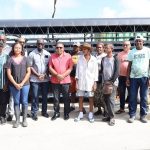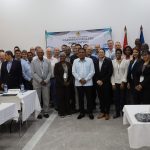The Minister of Agriculture, Guyana, attended the Conference of Ministers of Agriculture of the Americas, the 20th Regular Meeting of the Inter-American Board of Agriculture (IABA), which was held at the Head Quarters of the Inter-American Institute for Cooperation on Agriculture (IICA) from October 29 to November 1, 2019 in San Jose, Costa Rica. The Conference was declared open by the President of Costa Rica at a ceremony held in the National Auditorium of the Children’s Museum.
This biennial meeting is considered IICA’s most important meeting of Ministers of Agriculture of the western hemisphere. The Inter-American Board of Agriculture (IABA) comprises the Ministers of Agriculture of IICA’s member countries and is the Institute’s highest-level governing body. There were 28 Ministers of Agriculture in attendance including 13 from Cariforum countries. However, 33 countries were represented out of the 34 member states.
Main Topics Reviewed
The report, “The Outlook for Agriculture and Rural Development in the Americas: A Perspective on Latin America and the Caribbean” was accepted by the conference as a useful tool for the tasks of analysis and policy making.
The WTO agreement on the application of sanitary and phytosanitary measures
In considering the matter of Maximum Residue Limits (MRLs), the Board considered that IICA Member States in the Americas continue to face the challenge of producing food in a safer and sustainable way, and that farmers must be able to access the full range of tools and technologies available for agricultural production. It was also observed that farmers’ access to agricultural tools and technologies are increasingly limited by non-tariff measures in the target markets, which lack sufficient technical and scientific justification, and therefore have considerable negative impact on the production, productivity and trade in safe food and agricultural products. The meeting, therefore, resolved:
- To affirm the importance of the work undertaken by the WTO SPS Committee to examine pesticide-related issues that have an adverse impact on international trade in food and agricultural products.
- To achieve consensus in the Western Hemisphere on collaborative actions to address pesticide-related issues that impact agricultural trade including from developing countries, for example, through the promotion of collaboration in the generation of necessary data for setting trade-facilitative and regionally relevant MRLs, especially for specialty crops.
- To affirm the importance of risk analysis in assessing, managing and communicating risks of concern associated with pesticide use in order to protect public health while enabling the safe use of pesticides and facilitating trade in food and agricultural products.
- To commit to improving transparency and predictability in the setting of national MRLs
- To strengthen the implementation of the SPS Agreement by working collectively to enhance shared understanding of the provisions, including scientific justification, as they pertain to MRLs.
- To affirm the importance of the Codex Alimentarius Commission as the relevant international standard-setting body for pesticide MRLs and to actively enable and facilitate regional participation in the work of the Codex Committee on Pesticide Residues and Joint FAO/WHO Meeting on Pesticides Residues.
- To apply the same principles stated above to other issues associated with RLs, such as heavy metals.
Panel Discussions
Under the theme of the Conference – Cultivating Tomorrow’s Agriculture Today – a report on “Agriculture and Rurality in a Future of Permanent Change” also received in depth consideration by delegates. The Ministers considered the following three contextual elements:
- The changes that are reshaping the world suggest that, in coming decades, “business as usual” will no longer be a viable option, and agriculture will be at the epicenter of many of the changes.
- In recent decades, bioeconomy approaches have become established as the basis for a cycle of continuous, positive development that preserves and improves natural capital, while at the same time optimizing resource yields and utilization, and functioning effectively at every scale.
- The world of the future calls for a repositioning of agriculture and the rural milieu, opens up major opportunities for the Americas, and means that the nature of development strategies, and the way in which they are defined and implemented, have to be rethought.
Based on these parameters, three Panels of Ministers were established to focus on the following:
- Opportunities for rural inclusion in the digital era
- Toward a new balance between productivity and sustainability, and
- Health, safety and quality for the future of trade
Guyana’s Minister of Agriculture was invited to be a Panelist and to address the conference on “Toward a new balance between productivity and sustainability”.
Other Matters
The “Strategic Proposal for the Future of CATIE (the Tropical Agriculture Research and Higher Education Center (CATIE)), which is essentially the research and training component of IICA, was also considered and a special committee was established to study, analyse and make recommendations to the next Regular Meeting of the Executive Committee within a six month period.
Other statutory matters regarding the Minutes of the Executive Committee, approval of financial and programme budgetary allocations, report on the collection of quotas, 2017 and 2018 Financial Statements and reports of the external auditors of IICA, date and venue of the 20th Regular Meeting of IABA, etc. also received due attention of the Board.
It is noteworthy that Guyana was appointed as a member of the Executive Committee of IICA, which is responsible for managing the affairs of the organisation over the next two years until the next (21st) meeting of the Inter-American Board of Agriculture.






